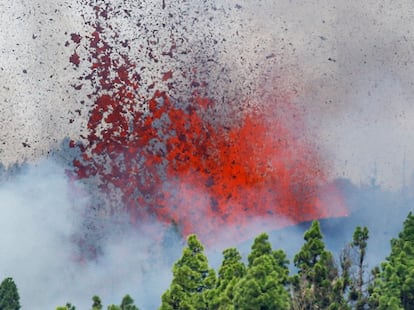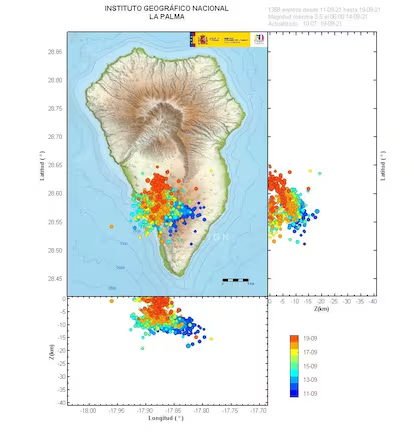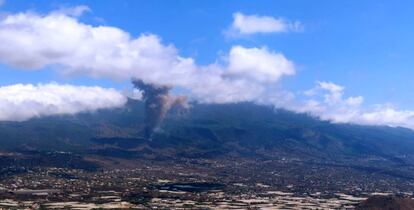Volcano erupts on Canary Island of La Palma
A large plume of smoke began spewing out in Montaña Rajada at 3.15pm, while Spanish authorities were carrying out a plan to evacuate residents with reduced mobility from nearby areas

A new volcano in La Palma in Spain’s Canary Islands erupted on Sunday at 3.15pm in the Montaña Rajada mountains in the municipality of El Paso. A small tremor hit the Las Manchas neighborhood before the volcano spewed out a great plume of smoke and ash. The magma caused two cracks in the mountain to open up, which both contained lava.
The eruption follows a series of constant small tremors, known as an earthquake swarm, which began on September 11 in Cumbre Vieja national park in the south of the island. The fast process, which has been releasing large amounts of energy, sparked the eruption, nearly 50 years after the eruption of Teneguía volcano.
The eruption on Sunday occurred in an uninhabited mountainous area, sparking small forest fires. Around 50 people with reduced mobility in nearby areas were evacuated before the volcano erupted. The regional health department said this group was safely transferred to El Fuerte, an old barracks, and is currently receiving care from health services and the Red Cross.
Following the eruption, authorities asked the population to stay away from the site, and issued a warning for possible lava flows. “In principle, the magma is coming down slowly, but we are worried about the speed it could pick up,” Nieves Rosa Arroyo Díaz, the island chief of security and emergencies, told Spanish news channel Canal 24 horas. “There is an outbreak of fire, but it is being controlled.”
Spanish Prime Minister Pedro Sánchez was scheduled to fly to New York on Sunday, but postponed the trip to travel to La Palma to address the situation on the ground. In a message on Twitter, the Defense Ministry said the army was ready to help provide shelter for people with special needs who have been evacuated from nearby areas.

After two days of calm, the seismic activity in La Palma resumed Sunday morning with several earthquakes that were felt by the population – the largest measuring 3.8 on the Richter scale – a clear sign that a volcanic eruption was imminent.
The tremors measuring 2 on the Richter scale hit one after the other at depths increasingly close to the surface in El Paso. According to the National Geographic Institute (IGN), three of these quakes were felt by residents on the island. Since the earthquake swarm began on September 11, IGN has recorded more than 6,600 small quakes in the Cumbre Vieja area.

On Monday, September 13, authorities decided to put the area on yellow alert – the second highest of the four-tiered system – for the risk of a volcanic eruption. Under this alert level, the population must be prepared and informed of the risk, a task that was being carried out over the last few days. Several meetings were held to discuss the situation with locals and evacuation plans were created in the case that the alert level rose to orange or red, with soccer fields set as meeting points. The yellow alert affected the municipalities of Fuencaliente, Los Llanos de Aridane, El Paso and Villa de Mazo, with around 35,000 people affected in total.
Volcanic activity in La Palma ceased after the eruption of Teneguía in 1971, but resumed again in 2017. Over the past few years, there have been several earthquake swarms, culminating in the most recent and intense one that began on September 11.

On Thursday, scientists recorded a 10-centimeter deformation in an area of Cumbre Vieja that was being hit by the tremors, which indicated that underground magma was pressuring the surface. The swelling eased in the following days, but on Sunday, it had increased to 15 centimeters, according to IGN.
The committee overseeing the situation, the Volcano Risk Prevention Plan (Pevolca), announced on Friday that stronger quakes were likely and warned of possible rockfalls, which led to the closure of certain hiking and forest paths.
English version by Melissa Kitson.
Tu suscripción se está usando en otro dispositivo
¿Quieres añadir otro usuario a tu suscripción?
Si continúas leyendo en este dispositivo, no se podrá leer en el otro.
FlechaTu suscripción se está usando en otro dispositivo y solo puedes acceder a EL PAÍS desde un dispositivo a la vez.
Si quieres compartir tu cuenta, cambia tu suscripción a la modalidad Premium, así podrás añadir otro usuario. Cada uno accederá con su propia cuenta de email, lo que os permitirá personalizar vuestra experiencia en EL PAÍS.
¿Tienes una suscripción de empresa? Accede aquí para contratar más cuentas.
En el caso de no saber quién está usando tu cuenta, te recomendamos cambiar tu contraseña aquí.
Si decides continuar compartiendo tu cuenta, este mensaje se mostrará en tu dispositivo y en el de la otra persona que está usando tu cuenta de forma indefinida, afectando a tu experiencia de lectura. Puedes consultar aquí los términos y condiciones de la suscripción digital.








































